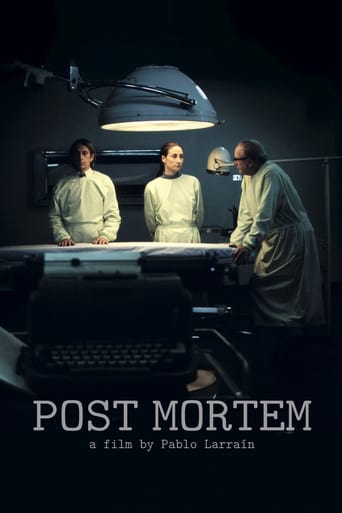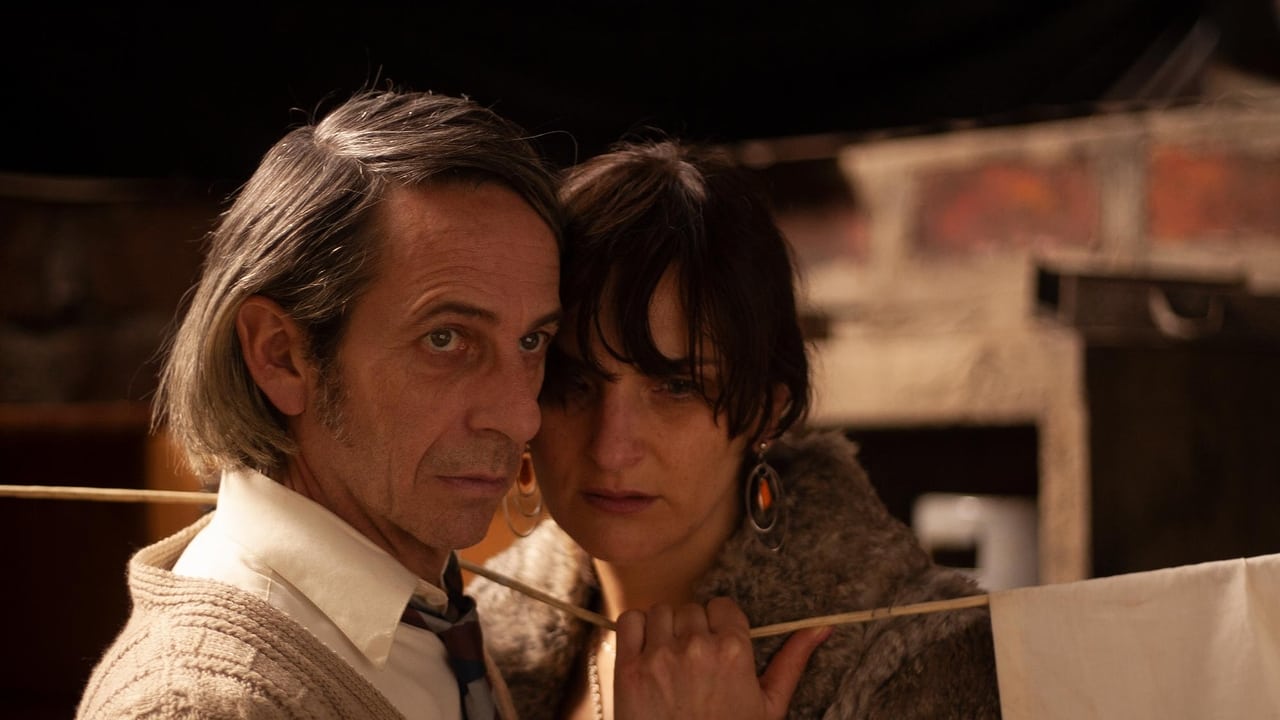gregking4
Set in Chile in 1973, during the final days of Allende's brutal dictatorship, Post Mortem is a rather bleak, downbeat and dreary drama. Chilean director Pablo Larrain (Tony Manero, etc) obviously is drawn towards sad, lonely obsessive protagonists with a psychotic streak. Victor (played by Marcelo Alonso, who also appeared in Tony Manero) is a civil servant who works in Santiago's morgue, typing out details of autopsies. He becomes obsessed with Nancy (Antonia Zegers), a beautiful neighbour who also works as a dancer in a local burlesque hall. During the brutal chaos of the coup, Nancy disappears. In a series of extended flashbacks we learn of her fate. Alonso's minimalist and coldly detached performance brings a suitably creepy edge to his impassive Victor. The film shares a similar visual style to Tony Manero, and those who appreciated that film may also enjoy this drama and its sharply political edge. The overt violence is kept to a minimum, but Larrain still manages to convey the horrors of Pinochet's bloody coup. Larrain loves his long takes, especially effective during the climax, but some linger far too long. Larrain's regular cinematographer Sergio Armstrong has shot the film in largely washed-out, brownish hues which adds to the oppressive atmosphere.
da_stikman
Chilean director Pablo Larrain successfully out-does his previous masterpiece 'Tony Manero'.'Post Mortem' builds gradually but once the revolution invades the lives of Mario and Nancy the film never loses pace. It really is one for those who love mix of lavish cinematography combined with gritty realism that Chilean cinema does so and Larrain is truly becoming one of the masters of South American cinema. It's a more mature, more European film than Manero but is all the better for it.A tender, slow-burn masterpiece.
jotix100
Pablo Larrain, the Chilean filmmaker of "Tony Manero", reunites once again with Alfredo Castro, the star of their last collaboration, in another dark, and creepy take on the events that tore down their country in the 1970s, the deposition of communist president Salvador Allende. Like the Civil War for Spanish creators, this infamous page on the history of Chile, looms large for Mr. Larrain, a man whose side on the story is clearly exposed in this movie, which he also wrote.We are taken to meet a somewhat weird man, Mario, a typist in Santiago's morgue. He is a solitary man who lives alone in a quiet neighborhood of the capital. Mario takes the dictation of the coroner that is conducting autopsies of the dead people brought to the morgue. Mario's neighbor, Nancy Puelma, a woman of a certain age, piques his curiosity. She works in a sort of small vaudeville theater that attracts the local "perverts", according to its manager. Mario begins to tail Nancy in a stealthy way.When Nancy is let go from the theater, Mario goes to plead with the owner to take her back. After following her, she finally agrees to go back home with Mario, they are interrupted by a tumultuous march of Allende's followers. Nancy spots a man that recognizes her, without much cajoling, she abandons Mario to be with this other stranger. Mario discovers that Nancy's house is being used by a communist group that is now being persecuted by the military police.The morgue begins to receive a lot of bodies. The coroner, Dr. Castillo, and his assistant Sandra, have to work extra hours to keep doing their job. Sandra, the somewhat taciturn woman, has made sexual advances to Mario, something that he always rejected. After all, Mario got lucky once with Nancy, feeling this other woman does not even compare with the one he loves. Mario witnesses that one of the supposed corpses is still alive. He cannot do anything for the woman because a military guard shoots her.One day, the coroner and his team are asked to go to a new location where a body of a man is in a room, in which a lot of military are observing the operation. Mario, who has been given an electric typewriter, cannot take the dictation his boss is giving. The body belongs to Salvador Allende himself. Sandra makes sure Mario understand he has been killed. He does not commit suicide, as the military men wants the autopsy report to read.As people go underground to save themselves from the persecution of the loyalists to Allende, Nancy's home becomes a haven for the group that has held meetings in her place. Mario discovers Nancy in a small storage room in back of the house. She pleads to bring her food, but by now, Mario feels betrayed by the woman, something that he decides to take care of in his own way."Post Mortem" has been shown in different festivals. We caught with it recently in DVD format. Mr. Larrain films are always dark, as shown in this new entry. The sordid atmosphere around the action goes hand in hand with what the director intended to do. It is not a story for everyone. It will probably resonate with people that know the history of Chile and that page of its history, rather than the casual viewer going to see it without any expectation as to what it is really about.Alfredo Castro's Mario is another creation for this actor that seems to be a natural collaborator for Mr. Larrain. He is shown with a ridiculous page boy hairstyle, a variation on the hairdo Javier Bardem's killer wore in "No Country For Old Men", but their personalities could not be different. Mr. Castro's restrained performance works well in the film. Antonia Zegers and Amparo Noguera are seen as Nancy and Sandra, Jaime Vadell and Marcelo Alonso do excellent work for Mr. Larrain.
elizabeth.matthews
"Pos-Mortem" won the 2nd Coral at the 2010 Havana film Festival, as well as acting prizes for two of the protagonists. It is a slow film, certainly, but builds up public and private tensions into a state of near-hysteria: violent scenes are suddenly deconstructed with moments of black humor -- clever and believable while upturning the viewers' anxiety. The political moment, the most dire in modern Chilean history, inserted into the dailiness of a job at a general hospital autopsy lab and morgue, shows both inexplicable social tragedy and, almost horribly, how familiarity with violent death almost, almost, breeds contempt. The quiet camera and murky grey lighting allow squarish, static settings to open slowly onto their meaning and context -- individual and historical; and the somewhat unsympathetic but not unappealing protagonist shows his true alienation and self-interest in a splendidly dark, comic finale. A clever, funny film with strong reminders of how the blackest history can repeat itself.


 AD
AD



